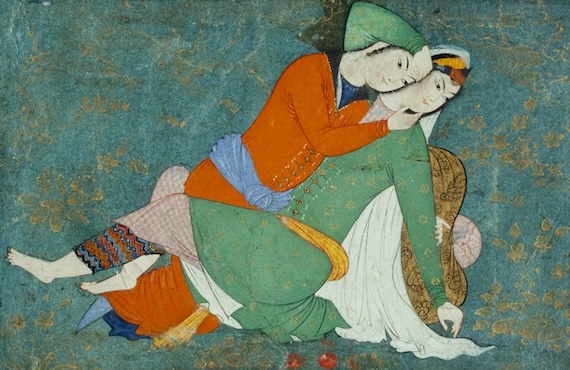The eleventh quatrain in the first edition Edward FitzGerald’s translation of the Rubáiyát of Omar Khayyám became one of the more famed poems in the English language. It epitomized romance for people in the late 19th and through the 20 century. Nervous young men brought it along on dates to read out as an ice breaker, especially as the rise of the automobile allowed a culture of dating — since couples could escape their parents’ houses and the watchful eyes of townspeople. I found one notice that a dentist in Britain gave the Rubáiyát to a woman patient, and her husband sued the dentist for attempted alienation of affection.
XI.
- Here with a Loaf of Bread beneath the Bough,
A Flask of Wine, a Book of Verse, and Thou
Beside me singing in the Wilderness —
And Wilderness is Paradise enow.
FitzGerald later revised it to its most renowned version:
- A book of Verses underneath the Bough,
A Jug of Wine, a Loaf of Bread — and Thou
Beside me singing in the Wilderness–
Oh, Wilderness were Paradise enow!
This stanza is entirely based on no. 149 of the Bodleian manuscript.
تُنْگی میِ لَعْل خواهم و دیوانی،
سَدِّ رَمَقی باید و نصف نانی،
وانگه من و تو نشسته در ویرانی،
خوشتر بُوَد آن ز مُلْکَتِ سلطانی
I translated it into contemporary American English, staying closer to the original, as no. 148 in my rendering of the entire Bodleian Ms.:
- A book of poetry, some ruby wine, and you,
and half a loaf of bread — I don’t need any more;
when you and I are curled up in the great outdoors,
our bliss outshines the glories of an emperor.
Transliteration:
tongi-ye may-e laʿl khᵛāham o divānī,
sadd-e ramqī bāyad o nesf-e nānī,
vāngah man o to neshaste dar vīrānī,
khosh-tar bovad ān ze molkat-e soltānī.
—-
Order Juan Cole’s contemporary poetic translation of the Rubáiyát from
or Barnes and Noble.
or for $16 at Amazon Kindle
——
The word that FitzGerald translated as “wilderness” (vīrānī) has the connotations of “ruin, desolation.” It is being contrasted to the opulent monarch’s golden court. Some bread, wine and poetry enjoyed by lovers away from the town, where fields turn to desert, the poem is saying, are superior in the happiness they bestow to the pomp and circumstance of palaces.
FitzGerald cleverly altered this contrast between humble surroundings and the royal court to one between earthly simplicity and visions of the afterlife. Here he was true to the unconventional quatrains attributed to Khayyam, which often prefer the actual pleasures of this world to what its authors viewed as the imaginary delights of paradise.
The miniature painters of Iran and Mughal India often showed lovers sneaking off to secluded gardens or woods (underneath a bough!), even though in medieval Iran and India gender segregation was the norm and dating was a death sentence if it became known– marriages were arranged. If one believes the poets and painters, though, the strict norms of society were at least sometimes successfully flaunted.

“The Lovers,” c. 1630–40 Persia (Iran). Ink, colors, and gold on paper. [Likely Safavid Isfahan.] Minneapolis Institute of Art.
The lesbian lovers Katherine Harris Bradley and Edith Emma Cooper, who wrote as “Michael Field,” took “Underneath the Bough” as the title for their 1893 volume of verse.
The phrase “Ah Wilderness,” which is how playwright Eugene O’Neill remembered the line, became the title of his play, set in 1906 at the height of the Omar craze in America, where it becomes an element in the adolescent rebellion of the protagonist. In 1935 it was made into a movie starring Wallace Beery, Lionel Barrymore, and Aline MacMahon. O’Neill was one of three writers of the script, and Metro Goldwyn Mayer paid more for the play script than any studio ever had before.
FitzGerald’s translation now seems old-fashioned, with its archaic use of “enow” for “enough.” Victorian poets often hearkened back to the medieval, as with Alfred Tennyson on Elaine and Lancelot in “Idylls of the King:”
- . . . ‘So be it,’ cried Elaine,
And lifted her fair face and moved away:
But he pursued her, calling, ‘Stay a little!
One golden minute’s grace! he wore your sleeve:
Would he break faith with one I may not name?
Must our true man change like a leaf at last?
Nay–like enow: why then, far be it from me
To cross our mighty Lancelot in his loves!
In their youths, FitzGerald and Tennyson were close friends, and FitzGerald played a role in Tennyson’s career, at one point supporting him financially. He arranged for a second edition of Tennyson’s second volume of poetry. Tennyson’s third outing, “In Memoriam,” caught Queen Victoria’s eye and she made him Poet Laureate.
For more commentaries on FitzGerald’s translations of the Rubáiyát, see
FitzGerald’s Rubáiyát of Omar Khayyám: Commentary by Juan Cole with Original Persian


 © 2026 All Rights Reserved
© 2026 All Rights Reserved